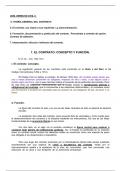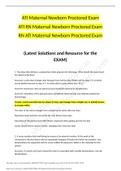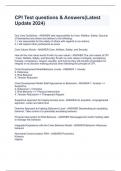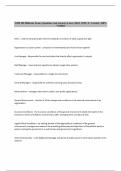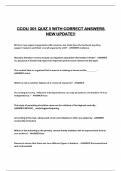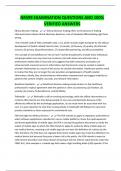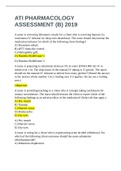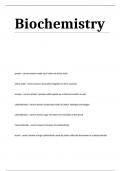All vaccine providers, public or private, are required by the National Vaccine
Childhood Injury Act to give the appropriate VIS to the patient (or parent or legal
representative) prior to every dose of specific vaccines.
Laws related to administering vaccines: VIS
The appropriate VIS must be given prior to the vaccination, and must be given prior
to each dose of a multi-dose series. It must be given regardless of the age of the
recipient.
The edition date of the VIS (found on the back at the right bottom corner).
The date the VIS is provided (i.e., the date of the visit when the vaccine is
What is required to be recorded in the administered).
medical record? The office address and name and title of the person who administers the vaccine.
The date the vaccine is administered.
The vaccine manufacturer and lot number.
Vaccines at birth Hep B
D - Dtap
R - Rotovirus
Vaccines at 4 months H - HIB
I - IPV
P - PCV
B - Hep B
D - Dtap
R - Rotovirus
Vaccines at 2 months
H - HIB
I - IPV
P - PCV
B - Hep B
D - Dtap
R - Rotovirus
Vaccines at 6 months
H - HIB
I - IPV
P - PCV
M - MMR
A - HepA
D - Dtap
Vaccines at 12-15 months
H - HIB
P - PCV
V- Varicella
VERY - Varicella
D - DTAP
Vaccines at 4-6 years
I - IPV
M - MMR
Resistance developed in response to infection with an agent resulting in antibody
production. Active immunity is usually permanent. Can be either naturally acquired
Active immunity
through exposure and infection with the disease or artificially acquired through
immunization. Onset is 2-4 weeks and duration is years to lifetime.
, A person is given antibodies to a disease rather than producing them through his or
her own immune system. This is short term immunity through introduction of
antibodies to a disease. Can occur naturally as in the passage of antibodies from the
Passive Immunity
mother to the fetus during pregnancy or artificially acquired through injection of
antibodies such as gamma globulin. Onset is within 24 hours of the dose and
duration is about 4-6 months.
This occurs when a significant portion of the population is vaccinated and that
provides a portion of immunity for those that have not developed immunity. The
Herd Immunity population (herd) helps prevent disease in the unprotected population. The herd
protects those who can not safely get vaccinations. Generally 90 -95% of the
population should be to be vaccinated to have effective Herd immunity.
3 dose schedule: 1st Should be given within 24 hours of birth (12 hours if mother + or
unknown HBsAg status). 2nd at 2 months and 3rd at 6 months.
Low rate of adverse events.
Hep B Vaccine
Contraindications: Do not give to anyone with serious allergic reaction to yeast.
Can be solo vaccine (engerix-B/Recombivax HB) or combined with Dtap & IPV
(pediarix)
Rotavirus is the most common cause of severe gastroenteritis among young children.
Two vaccines available - RV5 (Rotateq) and RV1 (Rotarix).
RV5 is 3 dose schedule at 2, 4, 6 months. RV1 is 2 dose schedule at 2 & 4 months.
Rotavirus Vaccine Risks and contraindications: Risk of intussusception, should not be given to infants
with history. RV1 should not be given to infants with severe latex allergy (package is
latex). Both vaccines are contraindicated in SCID. Should be deferred in infants with
acute moderate to sever gastroenteritis.
For prevention of diphtheria, tetanus, and pertussis (whooping cough)
Can be in combo with IPV & HepB, combo with IPV & HIB, or combo with IPV.
Should be deferred in individuals with progressive neuromuscular disorders until
DTaP Vaccine
neuro status is clarified and stabilized.
Moderate to severe systemic effects: fever, inconsolable crying, hypotonic-
hyporesponsive episodes.
Haemophilus influenzae type B - causes a wide spectrum of serious infections
bacterial illnesses, particularly in young children, including meningitis, epiglottitis,
pneumonia, septic arthritis, and cellulitis. Can be solo vaccine or combo with Dtap
HIB Vaccine and IPV. Given as series of 3 or 4 doses (depending on formula) OMP is 3 - T is 4.
Not recommended in children over 5 yrs
Should not be given to infants under 6 weeks
Adverse effects are uncommon.
Streptococcus pneumoniae - leading cause of invasive bacterial disease in children,
causes febrile bacteremia, bacterial sepsis, meningitis, and pneumonia. Also a
common cause of otitis media and sinusitis. Two vaccines in use: PCV13 and PCV23
(only 2yrs and older).
PCV13 given in 4 doses.
Pneumococcal vaccine Both vaccines should be deferred during moderate or severe acute illness with or
without fever.
Adverse effects: fever, injection site reactions, irritabilit, and increased or decreased
sleep.
Not proven - when given in conjunction with flu vaccine increased risk of febrile
seizures.

